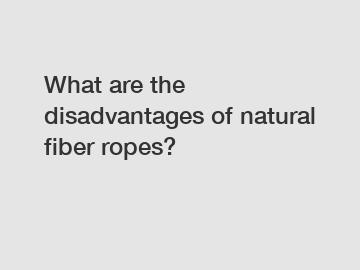What are the disadvantages of natural fiber ropes?
What are the Disadvantages of Natural Fiber Ropes?
Ropes have been used by humans for centuries for various purposes, such as towing, lifting, and securing objects. Natural fiber ropes, made from materials like hemp, jute, sisal, and cotton, have been widely used due to their affordability and biodegradability. However, like any other product, natural fiber ropes also have their limitations. In this article, we will explore the disadvantages of natural fiber ropes and why they may not always be the best choice for certain applications.
1. Limited Strength and Durability.

Natural fiber ropes, compared to their synthetic counterparts, possess lower strength and durability. These ropes tend to be weaker, making them less suitable for heavy-duty tasks. The fibers of natural ropes can easily break under excessive strain, impacting their overall lifespan. Additionally, natural fibers can be susceptible to degradation when exposed to moisture, chemicals, and UV rays, further compromising their strength over time.
2. Reduced Resistance to Abrasion.
Abrasion resistance is an important characteristic of ropes, especially in applications where the rope rubs against rough surfaces. Unfortunately, natural fiber ropes have poor resistance to abrasion. The fibers can wear down quickly, leading to fraying, breaking, and decreased overall performance. In scenarios where long-lasting and durable ropes are required, natural fibers may not be the optimal choice.
3. Vulnerability to Rot and Mildew.
One of the major disadvantages of natural fiber ropes is their susceptibility to rot and mildew. Due to their organic nature, these ropes can easily absorb moisture. Moisture retention promotes the growth of bacteria, fungi, and other microorganisms, leading to the development of rot and mildew. As a result, the ropes become weakened, brittle, and prone to breakage. Therefore, it is essential to keep natural fiber ropes dry and properly stored to minimize the risk of deterioration.
4. Sensitivity to Temperature and Weather Conditions.
Natural fiber ropes can be significantly affected by temperature and weather conditions. Extreme heat can cause the fibers to dry out and become brittle, reducing their strength. On the flip side, excessive moisture can lead to swelling and increased weight, affecting the rope's performance. Additionally, exposure to prolonged periods of sunlight can cause the fibers to degrade, fade, and lose their original properties. Hence, natural fiber ropes may not be the most suitable choice for outdoor applications in areas with severe weather conditions.
5. Cost and Availability.
While natural fiber ropes are generally more affordable than synthetic ropes, they may not be as readily available in certain markets. Due to the shift towards synthetic alternatives, finding a wide variety of natural fiber ropes can be challenging. Additionally, the production cost of synthetic ropes has decreased over time, making them more cost-effective for many applications. Hence, in some cases, the limited availability and higher cost of natural fiber ropes may be a significant disadvantage.
In conclusion, natural fiber ropes come with their own set of disadvantages that must be carefully considered before selecting them for specific applications. Limited strength and durability, reduced resistance to abrasion, vulnerability to rot and mildew, sensitivity to temperature and weather conditions, as well as cost and availability issues, are all factors that should be taken into account. If these disadvantages pose significant concerns or if the intended use requires more robust properties, it may be wise to explore synthetic rope alternatives. To learn more or discuss your specific needs, please contact us.
The company is the world’s best What Rope Does Not Stretch, Uses for Twine, Solid Braided Rope supplier. We are your one-stop shop for all needs. Our staff are highly-specialized and will help you find the product you need.
264
0
0

Comments
All Comments (0)